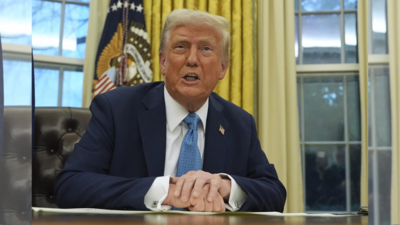
US President Donald Trump
US President Donald Trump announced sweeping new tariffs on imports from Mexico and China, a move that has triggered sharp reactions from global leaders and financial markets. The tariffs, which Trump says are aimed at protecting American workers and industries, have sparked fears of economic retaliation from affected countries.
Stock markets responded with significant declines, while business leaders warned of rising costs for consumers. Trump remains defiant, insisting that the "pain" will be worth it in the long run.
While the tariffs are positioned as a means to protect American industries and workers, they have raised concerns over potential economic retaliation, rising consumer prices, and the long-term impact on global trade.
Here are 10 key takeaways from the latest developments:
Canada, Mexico, China announce counter-measures
Retaliation has already begun, with Canada, Mexico, and China all announcing counter-measures against US goods. Mexico has targeted American-made steel, bourbon, and dairy products.
Starting February 4, Canada will impose 25% tariffs on $30 billion of US imports. The tariffs will apply to goods originating from the US, with specific guidelines outlined under the CUSMA regulations.
Trump speaks to Trudeau
In response to the tariffs, Trump held a call with Canadian Prime Minister Justin Trudeau. The conversation reportedly focused on potential exemptions for Canada, given its economic ties to the US. However, no assurances were given. Trudeau expressed concerns over how these tariffs could impact North American trade and warned that Canada might have to respond. Trump, in turn, reiterated his stance that the tariffs are necessary to combat what he called "unfair" trade practices.
Stock markets slide
Following the announcement, global stock markets saw a sharp decline, with US indices dropping significantly. Investors are worried about the broader economic impact, fearing a trade war could slow global growth. The Dow Jones Industrial Average plummeted, while European and Asian markets also took a hit. Analysts suggest that businesses heavily reliant on imports could suffer the most, leading to job losses and increased consumer prices.
Also read: Canada, Mexico, China bear the brunt; dollar surges while global currencies see extreme lows
What’s going to be more expensive?
A wide range of products is expected to see price hikes due to the tariffs. Consumer electronics, vehicles, and agricultural products top the list. Goods sourced from China, such as smartphones, laptops, and household appliances, could see significant price increases. Similarly, Mexican imports, including cars and food products like avocados, are likely to become more expensive. Retailers have warned that these tariffs will ultimately be passed on to consumers, leading to higher costs for everyday goods.
Also read: Trump imposes sweeping tariffs on Canada, Mexico and China
Peso, Yuan Canadian dollar weaken against USD
The dollar index rose 0.11% to 109.65, reaching a three-week high. Tariff news caused traders to reduce expectations for Federal Reserve rate cuts, now pricing in only 41 basis points of easing this year. The US dollar climbed 0.7% to 7.2552 yuan, while the Mexican peso surged 2.7% to 21.40. The Canadian dollar weakened 1.4%, and the euro fell 2.3%. Cryptocurrencies dropped, with Bitcoin falling 4.4% and Ether dropping 15%.
'Pain will be worth it': Trump
In a statement, Trump acknowledged that the tariffs might cause short-term pain but argued they were necessary to secure long-term economic benefits. "Will there be some pain? Yes, maybe (and maybe not!)" Trump said in a post. "But we will Make America Great Again, and it will all be worth the price that must be paid," the post added.

Trump has framed the tariffs as part of his broader effort to reduce America’s trade deficit and bring manufacturing jobs back to the US. He has urged companies to move production back to American soil to avoid the additional costs.
US manufacturers raise concerns
American manufacturers are among the hardest hit by the tariffs, particularly those that rely on imported materials from Mexico and China. Car manufacturers and electronics companies have warned that the additional costs could force them to cut jobs or move production overseas. Business groups have urged the Trump administration to reconsider, arguing that while tariffs may offer temporary protection, they could weaken the broader economy in the long run. Many industry leaders have called for negotiations rather than unilateral action.
EU next? Britain spared?
On Sunday, President Donald Trump suggested he would not immediately impose tariffs on Britain, though he hinted that the European Union might face tariffs similar to those on Canada, Mexico, and China. Trump has waged a trade war aiming to address migration and drug issues and to tackle trade deficits. He criticized the EU for its $300 billion trade surplus with the US, pointing out the lack of reciprocal trade in cars and farm products. Trump indicated a potential resolution with the UK, praising Prime Minister Keir Starmer and their productive discussions on balancing trade.
Business groups call for repeal
Major business organisations, including the US Chamber of Commerce, have strongly opposed the tariffs. They argue that protectionist policies could backfire, leading to higher costs and economic instability. Some trade associations have suggested that tariffs could hinder growth and force businesses to downsize. Economists have pointed out that while the strategy may appeal to Trump’s base, it could alienate allies and hurt America’s global economic standing. There is growing pressure from business leaders for the administration to pursue negotiations instead.

What happens next?
Some analysts believe negotiations between the US and its trade partners could lead to modifications or exemptions. Others fear a prolonged trade dispute that could disrupt global markets for years. Trump has indicated he is willing to negotiate but has also threatened further tariffs if China and Mexico do not comply with US demands.
(With inputs from agencies)

 2 hours ago
2
2 hours ago
2









